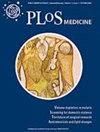Effects of a self-guided digital mental health self-help intervention for Syrian refugees in Egypt: A pragmatic randomized controlled trial.
IF 9.9
1区 医学
Q1 MEDICINE, GENERAL & INTERNAL
引用次数: 0
Abstract
BACKGROUND Digital mental health interventions for smartphones, such as the World Health Organization (WHO) Step-by-Step (SbS) program, are potentially scalable solutions to improve access to mental health and psychosocial support in refugee populations. Our study objective was to evaluate the effectiveness of SbS as self-guided intervention with optional message-based contact-on-demand (COD) support on reducing psychological distress, functional impairment, symptoms of posttraumatic stress disorder (PTSD), and self-identified problems in a sample of Syrian refugees residing in Egypt. METHODS AND FINDINGS We conducted a 2-arm pragmatic randomized controlled trial. A total of 538 Syrians residing in Egypt with elevated levels of psychological distress (Kessler Psychological Distress Scale; K10 > 15) and reduced psychosocial functioning (WHODAS 2.0 > 16) were randomized into SbS + CAU (N = 266) or CAU only (N = 272). Primary outcomes were psychological distress (Hopkins Symptom Checklist 25) and impaired functioning (WHO Disability Assessment Schedule 2.0) at 3-month follow-up. Secondary outcomes were symptoms of PTSD (PTSD Checklist for DSM-5 short form, PCL-5 short) and self-identified problems (Psychological Outcomes Profiles Scale, PSYCHLOPS). Intention-to-treat (ITT) analyses showed significant but small effects of condition on psychological distress (mean difference: -0.15; 95% CI: -0.28, -0.02; p = .02) and functioning (mean difference: -2.04; 95% CI: -3.87, -0.22; p = .02) at 3-month follow-up. There were no significant differences between groups on symptoms of PTSD and self-identified problems. Remission rates did not differ between conditions on any of the outcomes. COD was used by 9.4% of participants for a median of 1 contact per person. The main limitations are high intervention dropout and low utilization of COD support. CONCLUSIONS The trial provides a real-world implementation case, showing small positive effects of a digital, potentially scalable and self-guided mental health intervention for Syrian refugees in Egypt in reducing psychological distress and improving overall functioning. Further user-centered adaptations are required to improve adherence and effectiveness while maintaining scalability. TRIAL REGISTRATION German Register for Clinical Studies DRKS00023505.针对埃及叙利亚难民的数字心理健康自助干预的效果:实用随机对照试验。
背景世界卫生组织(WHO)的 "循序渐进"(SbS)计划等用于智能手机的数字心理健康干预措施是一种潜在的可扩展解决方案,可改善难民群体获得心理健康和社会心理支持的机会。我们的研究目标是评估SbS作为一种自我指导干预措施,与可选的基于信息的按需联系(COD)支持相结合,在减少居住在埃及的叙利亚难民样本的心理困扰、功能障碍、创伤后应激障碍(PTSD)症状和自我识别问题方面的有效性。共有 538 名居住在埃及的叙利亚人存在心理困扰(凯斯勒心理困扰量表;K10 > 15)和心理社会功能下降(WHODAS 2.0 > 16),他们被随机分配到 SbS + CAU(266 人)或仅 CAU(272 人)。主要结果是3个月随访时的心理困扰(霍普金斯症状检查表25)和功能受损(WHO残疾评估表2.0)。次要结果是创伤后应激障碍症状(PTSD Checklist for DSM-5 short form,PCL-5 short)和自认问题(Psychological Outcomes Profiles Scale,PSYCHLOPS)。意向治疗(ITT)分析显示,在 3 个月的随访中,治疗条件对心理困扰(平均差异:-0.15;95% CI:-0.28,-0.02;P = .02)和功能(平均差异:-2.04;95% CI:-3.87,-0.22;P = .02)的影响显著但较小。各组在创伤后应激障碍症状和自认问题方面没有明显差异。在任何结果上,不同组别的缓解率均无差异。有 9.4% 的参与者使用了 COD,每人接触次数中位数为 1 次。结论:该试验提供了一个真实世界的实施案例,显示了针对埃及境内叙利亚难民的数字化、潜在可扩展和自我指导的心理健康干预措施在减少心理困扰和改善整体功能方面的微小积极效果。在保持可扩展性的同时,还需要进一步以用户为中心进行调整,以提高依从性和有效性。
本文章由计算机程序翻译,如有差异,请以英文原文为准。
求助全文
约1分钟内获得全文
求助全文
来源期刊

PLoS Medicine
医学-医学:内科
CiteScore
21.60
自引率
0.60%
发文量
227
审稿时长
3 months
期刊介绍:
PLOS Medicine aims to be a leading platform for research and analysis on the global health challenges faced by humanity. The journal covers a wide range of topics, including biomedicine, the environment, society, and politics, that affect the well-being of individuals worldwide. It particularly highlights studies that contribute to clinical practice, health policy, or our understanding of disease mechanisms, with the ultimate goal of improving health outcomes in diverse settings.
Unwavering in its commitment to ethical standards, PLOS Medicine ensures integrity in medical publishing. This includes actively managing and transparently disclosing any conflicts of interest during the reporting, peer review, and publication processes. The journal promotes transparency by providing visibility into the review and publication procedures. It also encourages data sharing and the reuse of published work. Author rights are upheld, allowing them to retain copyright. Furthermore, PLOS Medicine strongly supports Open Access publishing, making research articles freely available to all without restrictions, facilitating widespread dissemination of knowledge. The journal does not endorse drug or medical device advertising and refrains from exclusive sales of reprints to avoid conflicts of interest.
 求助内容:
求助内容: 应助结果提醒方式:
应助结果提醒方式:


